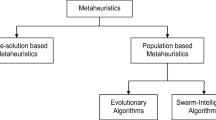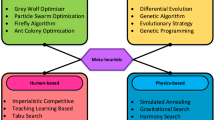Abstract
At present, the multiobjective optimization algorithm based on decomposition (MOEA/D) has become a typical algorithm for solving multiobjective problems. Following extensive experiments, researchers found that the choice of mutation operators in MOEA/D has a great influence on the quality of the solutions, and a suitable operator can largely improve the algorithm’s performance. This paper proposes a hybrid operator selection strategy based on feedback and support vector machine (SVM) classification, and applies it to the framework of MOEA/D. The algorithm divides the whole evolutionary process into several stages, and each stage is divided into two parts. In the first part, multiple mutation operators are given the same computing resources to generate offspring, then, we test the performance of each operator and elect the operator with the best performance. Meanwhile, an SVM classifier is trained by taking the truly evaluated offspring as the training set. Good operators do not always generate good offspring. Therefore, in the second part, we use the best performing operator selected in the first part to generate offspring, while using the trained classifier to filter all the newly generated solutions. The real evaluation should be carried out only when the offspring are identified as positive. Otherwise, it should be ignored to save the real evaluation computing resources. Additionally, the number of all positive individuals is recorded in the second part, which is when we decide whether to continue using this operator at the next stage or to reselect a more suitable operator. Experimental results verify the effectiveness of this strategy.





Similar content being viewed by others
Data availability
The datasets generated during the current study are available from the corresponding author on reasonable request.
References
Qian X (2013) Research on differential evolution multi-objective optimization algorithm. J Mech Transm 37(6):22–25
Miettinen K (2012) Nonlinear multiobjective optimization, vol 12
Zitzler E, Laumanns M, Thiele L (2001) Spea2: improving the strength pareto evolutionary algorithm. TIK-report 103
Deb K, Pratap A, Agarwal S, Meyarivan T (2002) A fast and elitist multiobjective genetic algorithm: Nsga-ii. IEEE Trans Evol Comput 6(2):182–197
Zitzler E, Künzli S (2004) Indicator-based selection in multiobjective search. In: International conference on parallel problem solving from nature. Springer, pp 832–842
Trivedi A, Srinivasan D, Sanyal K, Ghosh A (2017) A survey of multiobjective evolutionary algorithms based on decomposition. IEEE Trans Evol Comput
Zhang Q, Li H (2007) Moea/d: a multiobjective evolutionary algorithm based on decomposition. IEEE Trans Evol Comput 11(6):712–731
Zhang Q, Liu W, Li H (2009) The performance of a new version of moea/d on cec09 unconstrained mop test instances. In: 2009 IEEE congress on evolutionary computation, pp 203–208. IEEE
Li K, Fialho A, Kwong S, Zhang Q (2013) Adaptive operator selection with bandits for a multiobjective evolutionary algorithm based on decomposition. IEEE Trans Evol Comput 18(1):114–130
Yan Z, Tan Y, Zheng W, Meng L, Zhang H (2021) Leader recommend operators selection strategy for a multiobjective evolutionary algorithm based on decomposition. Inf Sci 550:166–188
Deb K (2001) Multi-objective optimization using evolutionary. John Wiley & Sons
Storn R, Price K (1997) Differential evolution - a simple and efficient heuristic for global optimization over continuous spaces. J Glob Optim 11(4):341–359
Qi Y, Hou Z, Yin M, Sun H, Huang J (2015) An immune multi-objective optimization algorithm with differential evolution inspired recombination. Appl Soft Comput 29:395–410
Li K, Fialho A, Kwong S, Zhang Q (2014) Adaptive operator selection with bandits for a multiobjective evolutionary algorithm based on decomposition. IEEE Trans Evol Comput 18(1):114–130
Lin X, Zhang Q, Kwong S (2016) A decomposition based multiobjective evolutionary algorithm with classification. In: 2016 IEEE congress on evolutionary computation (CEC), pp 3292–3299. IEEE
Wang Y, Cai Z, Zhang Q (2011) Differential evolution with composite trial vector generation strategies and control parameters. IEEE Trans Evol Comput 15(1):55–66
Madera J, Dorronsoro B (2006) Estimation of distribution algorithms
Vapnik V (2013) The nature of statistical learning theory
Zhang Q, Zhou A, Zhao S, Suganthan PN, Liu W, Tiwari S et al (2008) Multiobjective optimization test instances for the cec 2009 special session and competition. University of Essex, Colchester, UK and Nanyang technological University, Singapore, special session on performance assessment of multi-objective optimization algorithms. Tech Rep 264:1–30
Huband S, Hingston P, Barone L, While L (2006) A review of multiobjective test problems and a scalable test problem toolkit. IEEE Trans Evol Comput 10(5):477–506
Deb K, Thiele L, Laumanns M, Zitzler E. Scalable test problems for evolutionary multiobjective optimization. In: Evolutionary multiobjective optimization. Springer
Chang CC, Lin CJ (2011) Libsvm: a library for support vector machines. ACM Trans Intell Syst Technol
Zille H, Ishibuchi H, Mostaghim S, Nojima Y (2017) A framework for large-scale multiobjective optimization based on problem transformation. IEEE Trans Evol Comput 22(2):260–275
Tian Y, Zhang X, Wang C, Jin Y (2019) An evolutionary algorithm for large-scale sparse multiobjective optimization problems. IEEE Trans Evol Comput 24(2):380–393
Panichella A (2019) An adaptive evolutionary algorithm based on non-euclidean geometry for many-objective optimization. In: Proceedings of the genetic and evolutionary computation conference, pp 595–603
Zhang Q, Zhou A, Jin Y (2008) Rm-meda: a regularity model-based multiobjective estimation of distribution algorithm. IEEE Trans Evol Comput 12(1):41–63
Zitzler E, Thiele L (1999) Multiobjective evolutionary algorithms: a comparative case study and the strength pareto approach. IEEE Trans Evol Comput 3(4):257–271
Zitzler E, Deb K, Thiele L (2000) Comparison of multiobjective evolutionary algorithms: empirical results. Evol Comput 8(2):173–195
Zhao S-Z, Suganthan PN, Zhang Q (2012) Decomposition-based multiobjective evolutionary algorithm with an ensemble of neighborhood sizes. IEEE Trans Evol Comput 16(3):442–446
Li H, Zhang Q, Deng J (2016) Biased multiobjective optimization and decomposition algorithm. IEEE Trans Cybern 47(1):52–66
Yang S, Li M, Liu X, Zheng J (2013) A grid-based evolutionary algorithm for many-objective optimization. IEEE Trans Evol Comput 17(5):721–736
Xiang Y, Zhou Y, Li M, Chen Z (2016) A vector angle-based evolutionary algorithm for unconstrained many-objective optimization. IEEE Trans Evol Comput 21(1):131–152
Lin Q, Li J, Du Z, Chen J, Ming Z (2015) A novel multi-objective particle swarm optimization with multiple search strategies. Eur J Oper Res 247(3):732–744
Karafotias G, Hoogendoorn M, Eiben AE (2015) Parameter control in evolutionary algorithms: trends and challenges, pp 167–187
Acknowledgements
The work is partially supported by the National Natural Science Foundation of China (Nos. U1836216, 61702310, 61772322), the major fundamental research project of Shandong, China(No. ZR2020MF042, ZR2019ZD03), and the Taishan Scholar Project of Shandong, China.
Author information
Authors and Affiliations
Corresponding author
Additional information
Publisher's Note
Springer Nature remains neutral with regard to jurisdictional claims in published maps and institutional affiliations.
Rights and permissions
Springer Nature or its licensor (e.g. a society or other partner) holds exclusive rights to this article under a publishing agreement with the author(s) or other rightsholder(s); author self-archiving of the accepted manuscript version of this article is solely governed by the terms of such publishing agreement and applicable law.
About this article
Cite this article
Chen, H., Tan, Y., Yan, Z. et al. Optimal operator selection based on the hybrid operator selection strategy. Memetic Comp. 14, 461–476 (2022). https://doi.org/10.1007/s12293-022-00382-9
Received:
Accepted:
Published:
Issue Date:
DOI: https://doi.org/10.1007/s12293-022-00382-9




